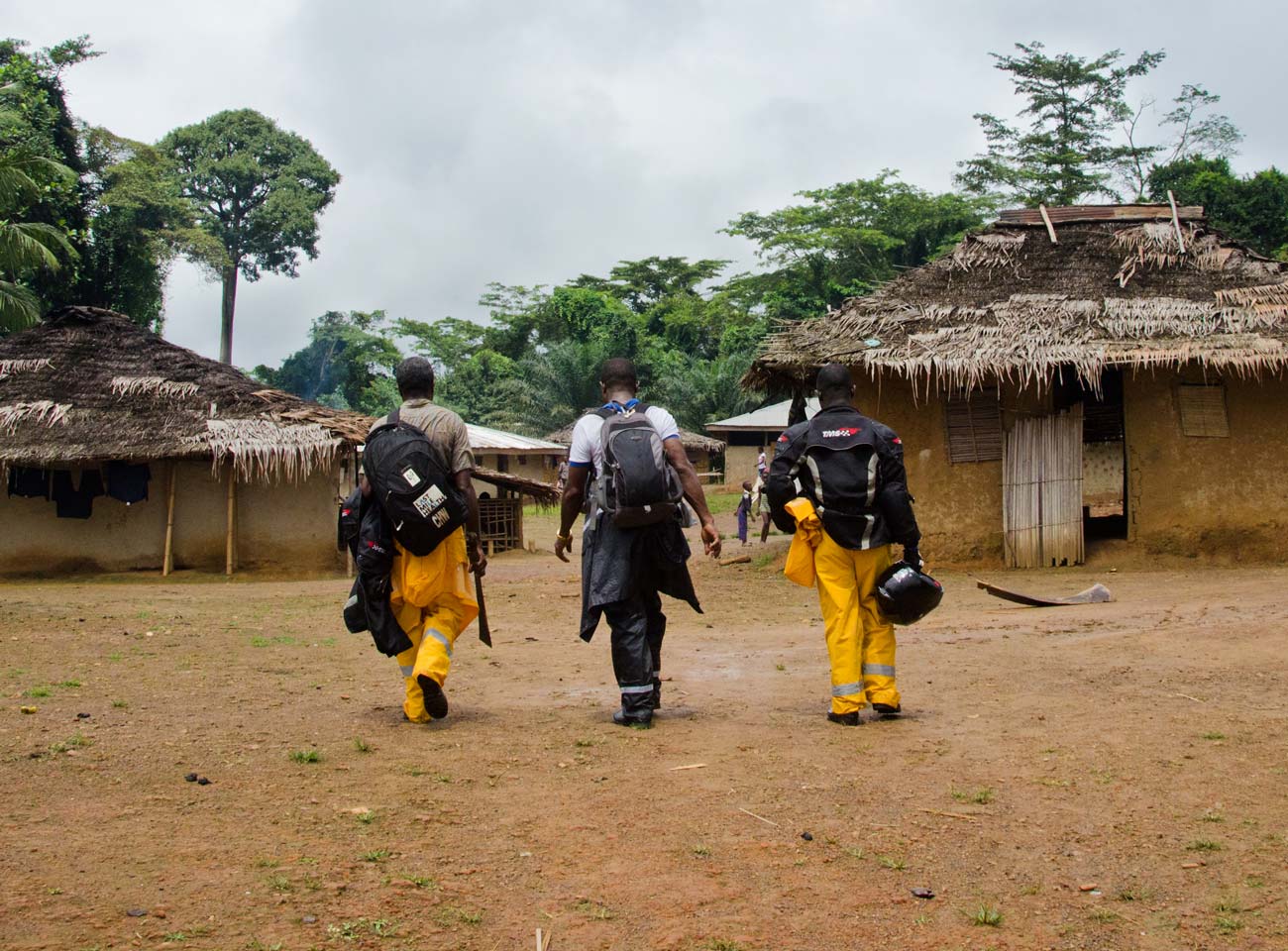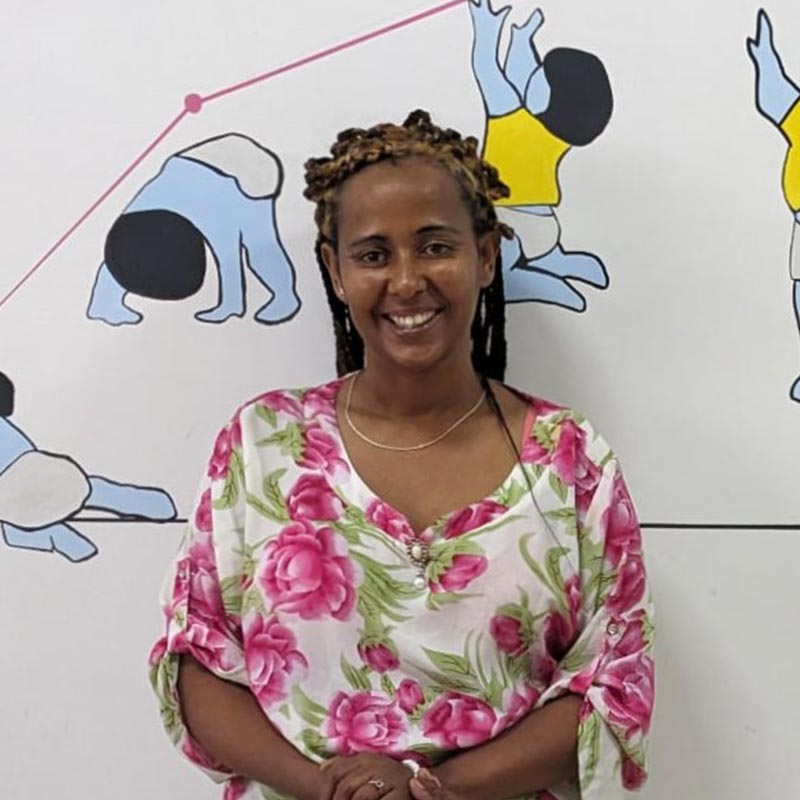2024 Annual Letter
Dear partners,
In my time at Last Mile Health, I’ve had the privilege of coming back to the same communities time and time again, reconnecting with the same local leaders: community health workers. They’ve recounted the enormous challenges they’ve navigated—from disease outbreaks like Ebola to climate-driven health crises to the threat of gender-based violence. Throughout these unpredictable times, community health workers are a mainstay: a lifeline delivering primary care to patients when no one else could. Now more than ever, investing in community-led primary care is crucial.
Community health workers don’t just deliver care: they deliver change. They foster trust, resilience, and hope. From connecting a pregnant mother with a healthcare facility to safely deliver her baby, to ensuring a child receives the immunizations that will protect her from life-threatening illness, they drive tangible change in their communities each day, delivering both healthcare and hope even in the face of crisis. At the heart of strong, sustainable, and resilient community health systems, community health workers ensure their neighbors can keep their families healthy and safe even amid today’s most pressing challenges.


We are still far from achieving Last Mile Health’s vision of a health worker within reach of everyone, everywhere—and in today’s world, we can’t afford to wait. Community health workers themselves are best positioned to explain why their work matters, and what support they need. Here, I’m humbled to lift up the voices of three community health workers who bring lifesaving primary care to their communities each day.
Keeping women safe and healthy:
Serkalem Getachew

Serkalem Getachew has delivered primary care in Legambo District, Ethiopia, for nearly 15 years. A mother herself, she is especially passionate about maternal and child health. “I want to help women and their children,” she explains. “I try to be as close as I can as much as possible to build a strong relationship with my community to help give them support in keeping a healthy home and family.” Recently, security challenges have disrupted access to health facilities and resources, making Serkalem the only link to healthcare for her community. “There are many challenges in our service, such as materials and equipment,” she shares. Serkalem and her colleagues in Ethiopia’s all-female community health workforce face an additional threat all too common among women health workers: “We travel long distances for home visits and we face the threat of gender-based violence,” she says. “We are not accepted by men when we discuss family planning. But women need our services.” Even in the face of these challenges, Serkalem has maintained routine health services—and maintained her track record of zero maternal and child deaths in her community.
Strong health systems ensure Serkalem and her 40,000+ colleagues can deliver care, no matter what. In particular, Serkalem is grateful for the digital tools and training she’s received through Last Mile Health’s partnership with the Ministry of Health. Her knowledge and skills have equipped her to deliver quality care in critical areas such as sick child management, immunization, and newborn care, helping her community stay healthy and resilient. Serkalem calls on health leaders, implementers, and funding partners to invest in community health for communities like hers, ensuring mothers and children receive reliable care even in the face of challenges. She also emphasizes the need to keep women community health workers safe. In response to the urgent need for gender equity in the community health workforce—from personal safety to fair pay and opportunities for advancement—Last Mile Health, in partnership with Integrate Health, has developed a framework laying out 16 recommendations for how governments, funders, and implementing partners can give women like Serkalem the safety and support they need to provide care.
Preparing for climate change:
John Wabwire

In Kenya—one of 17 countries where Last Mile Health’s Africa Frontline First initiative partners with governments and funders like the Global Fund to unlock and optimize community health financing—John Wabwire has been a community health worker and community advocate for nearly 20 years. “I am a survivor of HIV and tuberculosis, and I joined the community health unit because I was motivated to help other survivors learn they can live and even grow old with these illnesses if they get the care they need,” he explains. Over his two decades of service, he has felt a growing urgency to help his rural community adapt to the growing impact of climate change on health. “Climate is affecting us very much in Budalangi,” he says. An increase in flooding has led to standing water and contamination. “This leads to malaria and diseases caused by bad water,” says John. “As a community health worker, I am the one who can educate my community about climate change and help them understand the health problems it can cause and how they can address these problems.”
While climate change is beyond his community’s control, they can prepare for its impacts—and John is committed to helping his neighbors mitigate its health shocks. He has taken courses to improve his understanding of climate change and the health crises it drives, and holds regular meetings to share his knowledge and help Budalangi build resiliency. “Community health workers are in the position to talk to the community about climate,” he says. “We can teach our neighbors about impacts of climate change in the household. We can learn what diseases and conditions can increase because of climate change, and how we can be prepared. We can look out for diseases, educate the community. We can be ready to provide care right away if we have the right knowledge and training.” He is a vocal advocate for ensuring all community health workers receive training on climate change. “Primary health is connected with climate, and the climate is impacting us very much in rural communities. We must be prepared. I want to tell the whole world that this needs to be done.”
Counting down to zero outbreaks:
Victoria Karpay

In the wake of a decade of civil war, Ebola dealt an enormous blow to Liberia’s devastated health system. Amidst the tragedy, community health workers provided a point of hope: in communities where trained community health workers operated with support from Last Mile Health, routine health services continued undisrupted. Today, with a fully-scaled national community health workforce, the country’s community health workers and supervisors are tackling another disease threat: malaria, the leading cause of death in children under five.
“Malaria is the biggest problem for us in Taye Town,” says community health worker Victoria Karpay from her community in Grand Bassa County, Liberia. “In this community, we never understood how diseases like malaria come in. We didn’t understand the danger signs in a child, and what we should do if a child showed those signs. But after I received my training, I educated my community. Now everyone knows that if any child is showing those signs, they will come to me right away.” The education, preventive care, treatments, and referrals Victoria provides have driven strong health outcomes in her community. “Since I started working as a community health worker, I have experienced no child death in my community,” she says.
Although education, insecticide-treated nets, and rapid testing, and treatment have driven improvements in malaria prevalence and mortality, serious risks remain for infants and young children. This year, Liberia’s National Community Health Program began rolling out the highly anticipated malaria vaccine with support from GSK, incorporating it into the routine childhood immunization package. At the heart of the vaccine rollout: community health workers, who are educating their communities, connecting families to the community health supervisors who administer vaccinations, and tracking children to ensure they receive all four doses. A strong, fully scaled community health program makes the ambitious vaccine initiative possible, with community health workers driving demand thanks to the trust they’ve built. “Community health workers are important because we connect our people to the health system. They listen to our message when we tell them about facility delivery or vaccines,” says Victoria. The rollout has not yet reached Taye Town, but already, she has seen the difference reliable access to healthcare has made in building a resilient, healthy community. “Before the program came here, we had more problems with health. Now we feel uplifted.”
For communities like Taye Town, access to reliable healthcare—and trust in the community health workers who deliver it—has changed outlooks and outcomes. And the malaria vaccine offers new hope. “We are counting down to zero outbreaks and zero child deaths,” says Victoria.
The time is now:
Investing in community-led primary care
Every day, community health workers like Serkalem, John, and Victoria deliver quality primary care—but far too many communities globally still lack access to these agents of change. As I reflect on the challenges impacting communities around the world, I feel a profound sense of urgency. Today’s global crises are the reality. We must make community-led primary care the reality, too: families around the world can’t wait. And to do this, we must start at the community level, with communities themselves leading the way.
Throughout my time at Last Mile Health, I’ve seen more and more leaders and changemakers advocate for the power of community health. From global health institutions to philanthropists and multilaterals, people in power are beginning to recognize that community health workers like Serkalem, John, and Victoria are driving real progress. With this shift, it can be easy to assume that we’ve achieved our goals—that universal health coverage is within reach. But across communities and countries, enormous gaps remain. Community health worker programs aren’t yet universal—and even where programs exist, they are often not supported with sufficient investment or providing community health workers with the support they need to deliver the quality care patients deserve. In the context of global challenges, this need is more urgent than ever.
Amid unpredictable times, community health workers are a mainstay. We know that when they are supported with the skills, supplies, salaries, and supervision they need, they save lives. We also know that when they are supported, they keep showing up—day in and day out. Now, we need to continue to show up for them.
Delivering care to all, together
There’s no simple solution to today’s global challenges—but there is a way toward ensuring those most vulnerable are equipped to navigate these shocks. Alongside government partners, funding partners, and community health workers, we are equipping communities to withstand new and existing threats. The time is now to commit to a real, lasting solution: strong, resilient communities led by community health workers, ensuring all people can access the care they need, no matter what.
Truly,
Lisha McCormick, Chief Executive Officer
Join Us
TO BRING A HEALTH WORKER
WITHIN REACH OF EVERYONE,
EVERYWHERE.
SUPPORT OUR WORK >
